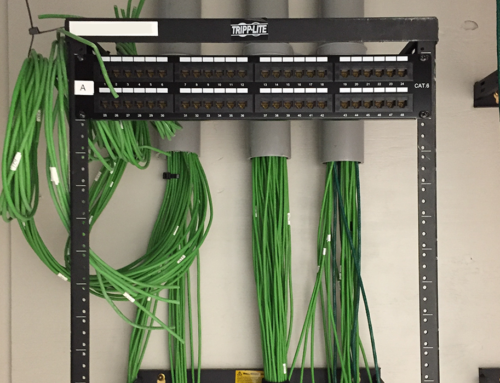Many small healthcare offices believe that using a cloud-based Electronic Health Records (EHR) system ensures their data security and HIPAA compliance. While cloud providers typically include HIPAA-compliant storage and backup solutions, relying solely on the cloud doesn’t address critical security gaps in your office’s infrastructure. These vulnerabilities include unsecured endpoints, weak network security, unencrypted devices, and outdated firewalls—all of which can expose your practice to cyberattacks, data breaches, and costly HIPAA violations.
The Growing Threat to Small Healthcare Practices
Cybercriminals are increasingly targeting smaller healthcare offices due to weaker security systems compared to larger hospitals. The 2023 Verizon Data Breach Investigations Report shows that 44% of healthcare breaches happened at healthcare providers, many of which were small practices. Even if your EHR is securely hosted in the cloud, endpoints like computers, mobile devices, and tablets are vulnerable to breaches if not properly secured.
Additionally, weak network security can leave patient data exposed, even when using a compliant cloud provider. According to the Ponemon Institute, 82% of healthcare breaches involve human error or weak network protection, underscoring the need for comprehensive security measures beyond cloud hosting. Small practices are especially attractive to attackers because they often lack advanced security infrastructure, leading to significant financial and reputational harm.
Why Cloud EHR Isn’t Enough: Key Areas You Must Secure
Although your cloud-based EHR might be secure, here are the key areas that small healthcare practices often overlook but must address to stay HIPAA-compliant and protect patient data:
1. Device Encryption
- HIPAA Requirement: HIPAA’s Security Rule (45 CFR § 164.312(a)(2)(iv)) strongly recommends encrypting any device that stores or transmits electronic Protected Health Information (ePHI). Laptops, tablets, and mobile devices used to access ePHI must have full-disk encryption to protect patient data.
- Why It Matters: Unencrypted devices are a significant risk. If a device is stolen or lost, ePHI can be easily accessed by malicious actors. Encryption ensures that even if a device is compromised, the data remains protected.
- Rooted Solution: Rooted Technology Solutions provides comprehensive endpoint encryption to ensure that all devices accessing sensitive data meet HIPAA standards.
2. Weak Wi-Fi Security
- HIPAA Requirement: HIPAA mandates that all networks transmitting ePHI be secured (45 CFR § 164.312(e)(1)). This includes ensuring that wireless networks use strong encryption (WPA3 or WPA2) and complex passwords.
- Why It Matters: Many small practices use weak or default Wi-Fi passwords, leaving their networks vulnerable to unauthorized access. Unsecured Wi-Fi allows attackers to intercept sensitive data being transmitted between your office and the cloud.
- Rooted Solution: Rooted provides network security assessments to ensure that your wireless networks are secure, properly encrypted, and using strong passwords, keeping your practice safe from unauthorized access.
3. Outdated or Poorly Configured Firewalls
- HIPAA Requirement: Firewalls are a critical component of network security, required by HIPAA to prevent unauthorized access to ePHI (45 CFR § 164.312(c)(1)). Firewalls must be regularly updated and properly configured to meet compliance standards.
- Why It Matters: Many practices use outdated firewalls or have poorly configured ones that fail to block malicious traffic or prevent data leaks. Neglecting firewall updates leaves your network exposed to attacks that can lead to unauthorized access and data breaches.
- Rooted Solution: Rooted’s Firewall and VPN Solutions ensure that your firewalls are up-to-date, properly configured, and monitored for any signs of intrusion, protecting your network from outside threats.
4. Endpoint Security and Monitoring
- HIPAA Requirement: HIPAA requires healthcare organizations to implement security measures for all devices accessing ePHI (45 CFR § 164.308(a)(5)). This includes antivirus software, malware protection, and regular monitoring of all endpoints.
- Why It Matters: Unprotected endpoints—whether they are computers, tablets, or mobile devices—are common entry points for attackers. Without strong endpoint security, your practice is vulnerable to ransomware and other attacks that could compromise patient data.
- Rooted Solution: Rooted offers comprehensive endpoint security solutions, including antivirus, malware protection, and continuous monitoring, ensuring that all devices are protected against cyber threats.
5. Employee Training on Cybersecurity
- HIPAA Requirement: HIPAA mandates regular security awareness training for all employees who handle ePHI (45 CFR § 164.308(a)(5)). This includes educating staff on best practices for data security, phishing attacks, and safe handling of sensitive information.
- Why It Matters: According to the 2023 Ponemon Institute, 82% of healthcare data breaches involve human error, such as falling for phishing scams or mishandling ePHI. Without proper training, employees may inadvertently expose patient data to attackers.
- Rooted Solution: Rooted provides customized employee training programs, including phishing simulations, to ensure your staff is fully equipped to recognize and prevent cyber threats.
6. Email Encryption and Archiving
- HIPAA Requirement: Any email containing ePHI must be encrypted in transit (45 CFR § 164.312(e)(1)). Additionally, HIPAA requires that all ePHI communications be securely stored, which may include email archiving for compliance audits.
- Why It Matters: Unencrypted emails are a major source of data breaches in healthcare. Sensitive information transmitted without encryption can easily be intercepted by attackers. In addition, failure to archive emails properly can result in non-compliance with HIPAA audit requirements.
- Rooted Solution: Rooted’s Email Encryption and Archiving Solutions ensure that all email communications are fully encrypted, archived, and compliant with HIPAA regulations.
How Rooted Technology Solutions Can Help
At Rooted Technology Solutions, we specialize in helping small healthcare practices like yours stay secure and compliant with HIPAA regulations. While cloud-based EHR systems offer security at the storage level, your office’s network, devices, and staff remain vulnerable to cyberattacks without the right safeguards.
Rooted offers a comprehensive suite of managed IT services tailored specifically for healthcare providers, including:
- Network security assessments and firewall management to ensure your Wi-Fi and network infrastructure are HIPAA-compliant.
- Full device encryption and endpoint security to protect every device that interacts with patient data.
- Email encryption and archiving to safeguard your communications and ensure regulatory compliance.
- Employee training programs to reduce the risk of human error and improve cybersecurity awareness among your staff.
Book a No-Cost HIPAA Compliance Consultation
Don’t leave your healthcare practice vulnerable to cyber threats. Contact Rooted Technology Solutions today for a no-cost consultation, and let us help you secure your network, protect your devices, and ensure HIPAA compliance. We’ll assess your current infrastructure, identify any vulnerabilities, and develop a tailored solution to keep your practice—and your patients’ data—safe. Call (251) 929-4600 or email Ben at ben@rootedts.com to schedule your consultation.







